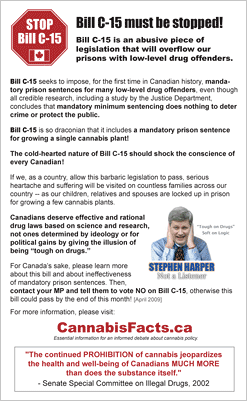http://cannabisfacts.ca/mandatoryminimums_chart.html
Well that's the last straw!!
This groovygranny is growing a HUGE pot plant in my front yard this summer, taking a great big picture of me with it, with my reading glasses and a walking stick (for the 'thritis & muggers), and a shot of tequila for the chill, and a pointy old finger, and blowing it up to a poster and sending it to Stephen Harper with a note:
COME AND GET ME FUCKER!!!
Then I'm going to paste that on billboards everywhere.
Who's in?
Oh wait ... we'll use smokin maryjane ...
http://img1.photographersdirect.com/img/14...wm/pd768975.jpg
--------------------
Never set your sites so low that your view is blocked by an asshole.












